Must reads

Biodiversity Finance Factbook
The world has just five years remaining to achieve the targets of the Global Biodiversity Framework, nature’s equivalent of the Paris Agreement for climate. Doing so requires an increase in financial mobilization and political will; COP30, in Belem, provides an opportunity for participants to address both. This report assesses the state of biodiversity finance, updates our funding priority regions and includes analysis of progress on various nature-related indicators.
November 6, 2025
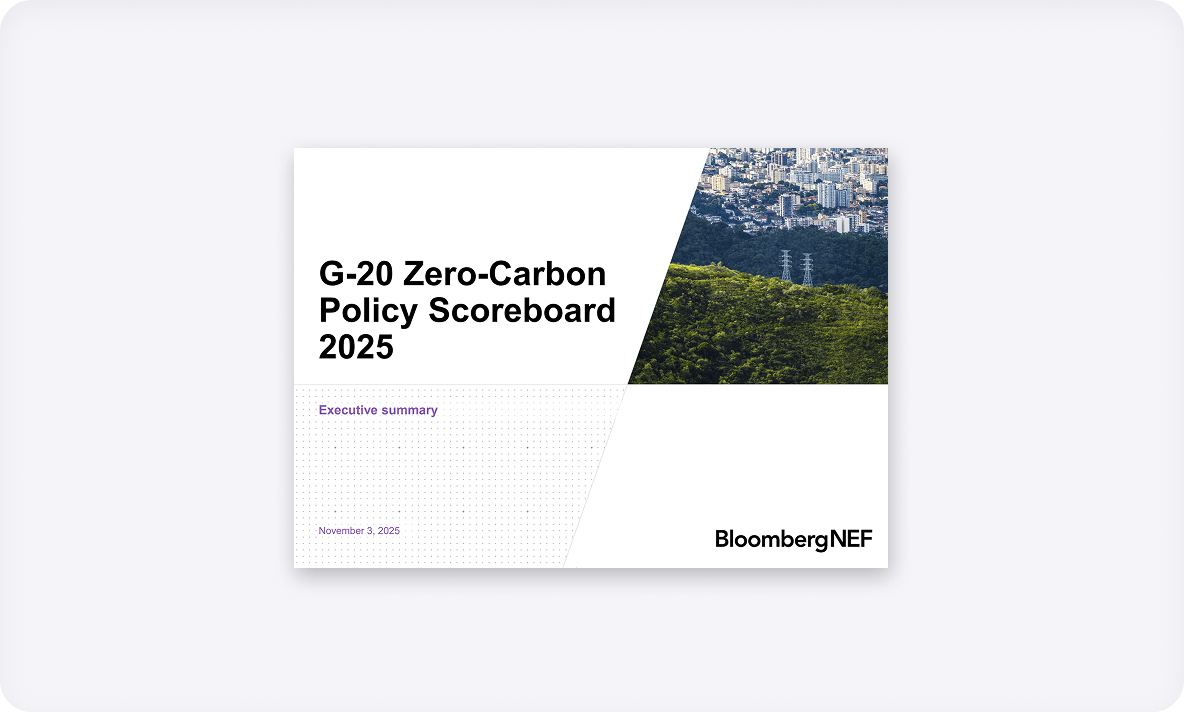
G-20 Zero-Carbon Policy Scoreboard 2025
All emerging markets in the Group of 20 have bolstered low-carbon policy in the last year, according to BloombergNEF’s latest Policy Scoreboard, which tracks green government support across the G-20. This progress counterbalances backsliding by some high-income economies – in particular the US and, to a lesser extent, the European Union. Together, the G-20 accounts for roughly 75% of global emissions, meaning its action, or inaction, will largely determine the pace of the energy transition.
November 3, 2025

Climatescope 2025
Climatescope is BloombergNEF’s annual online market assessment tool, report and index evaluating individual markets’ relative readiness to put energy transition investment to work. This is the 14th annual edition of the report. Since its inception, Climatescope has evolved and expanded, and it now includes detailed information on 140 markets around the world – or nearly every market with more than 2 million inhabitants.
November 3, 2025
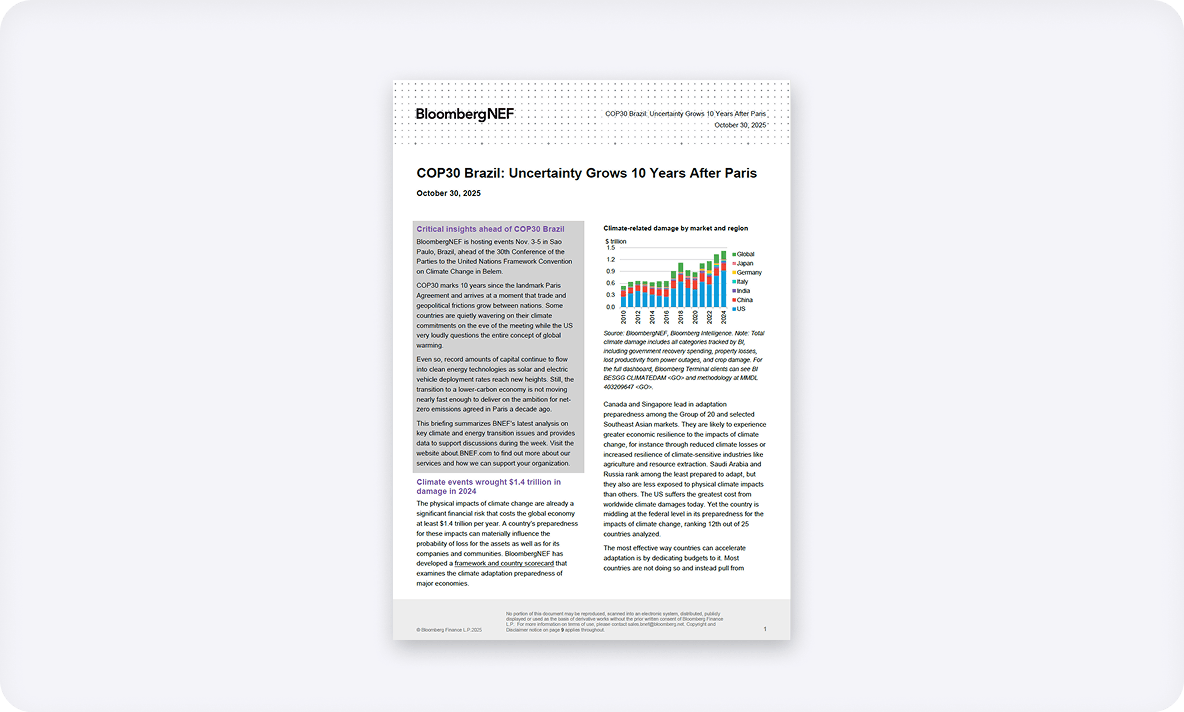
COP30 Brazil: 10 Years Post-Paris, Uncertainty Reigns
COP30 marks 10 years since the landmark Paris Agreement and arrives at a moment that trade and geopolitical frictions grow between nations. This briefing summarizes BNEF’s latest analysis on key climate and energy transition issues and provides data to support discussions during the conference.
October 30, 2025
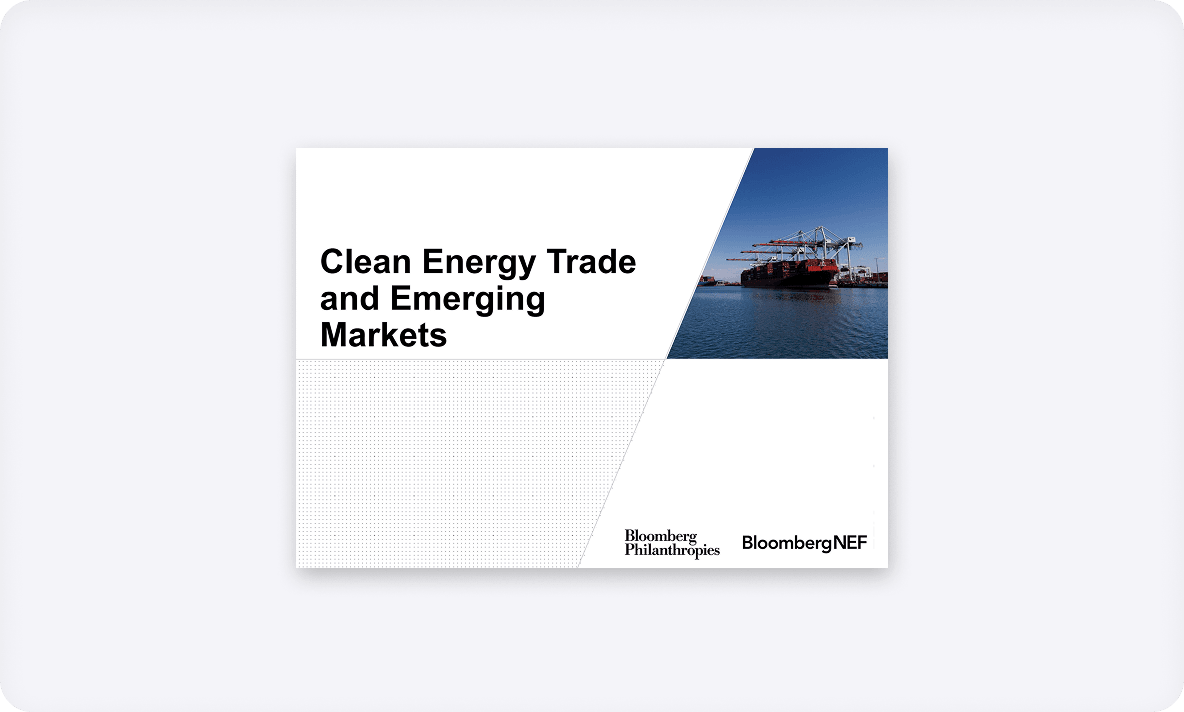
Clean Energy Trade and Emerging Markets
The Clean Energy Trade and Emerging Markets report, produced by BloombergNEF and commissioned by Bloomberg Philanthropies, aims to support policy, business and investment professionals by making available key data about the state of supply chains and trade across electric vehicles, batteries, solar products and wind turbines.
October 30, 2025
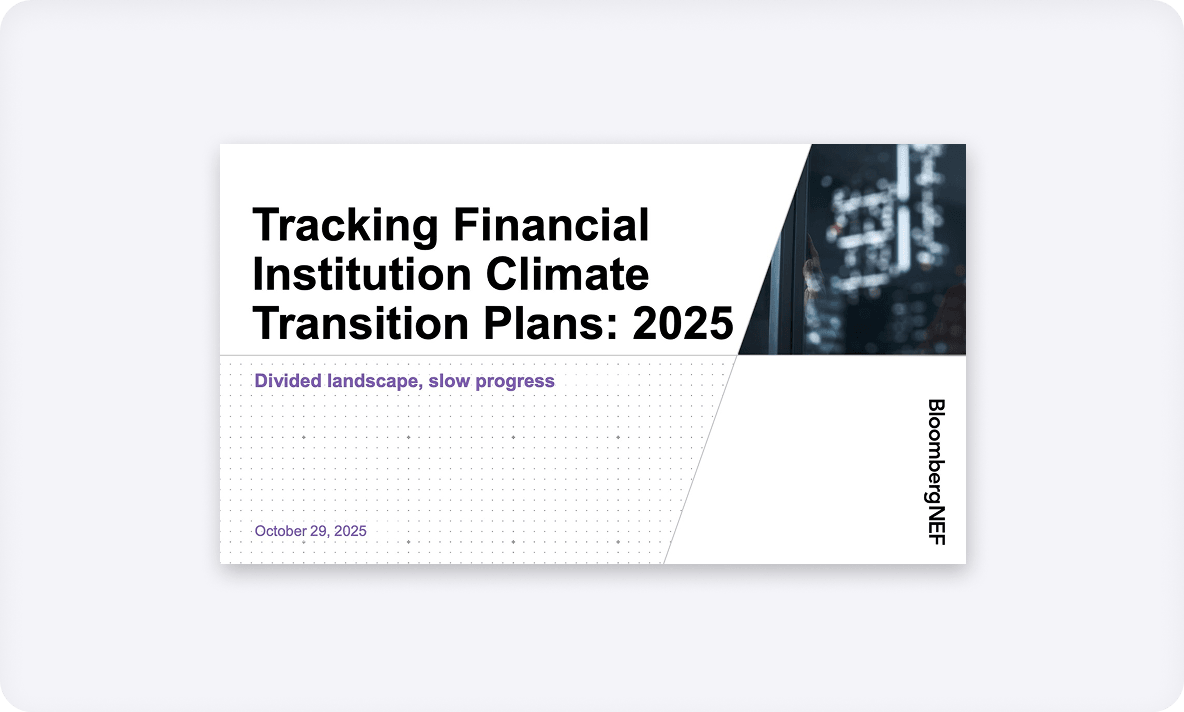
Tracking Financial Institution Climate Transition Plans: 2025
The state of transition plan disclosure is divided in the financial sector. Weighted by market capitalization, 44% of the sector has disclosed complete transition plans across all 10 components of a best-practice framework. Larger institutions, and those with experience in net-zero alliances, drive this total up, while disclosure among smaller institutions still lags. Progress on transition plan reporting remains a crucial indicator of whether financials are advancing their thinking and actions on the path to net zero.
October 29, 2025
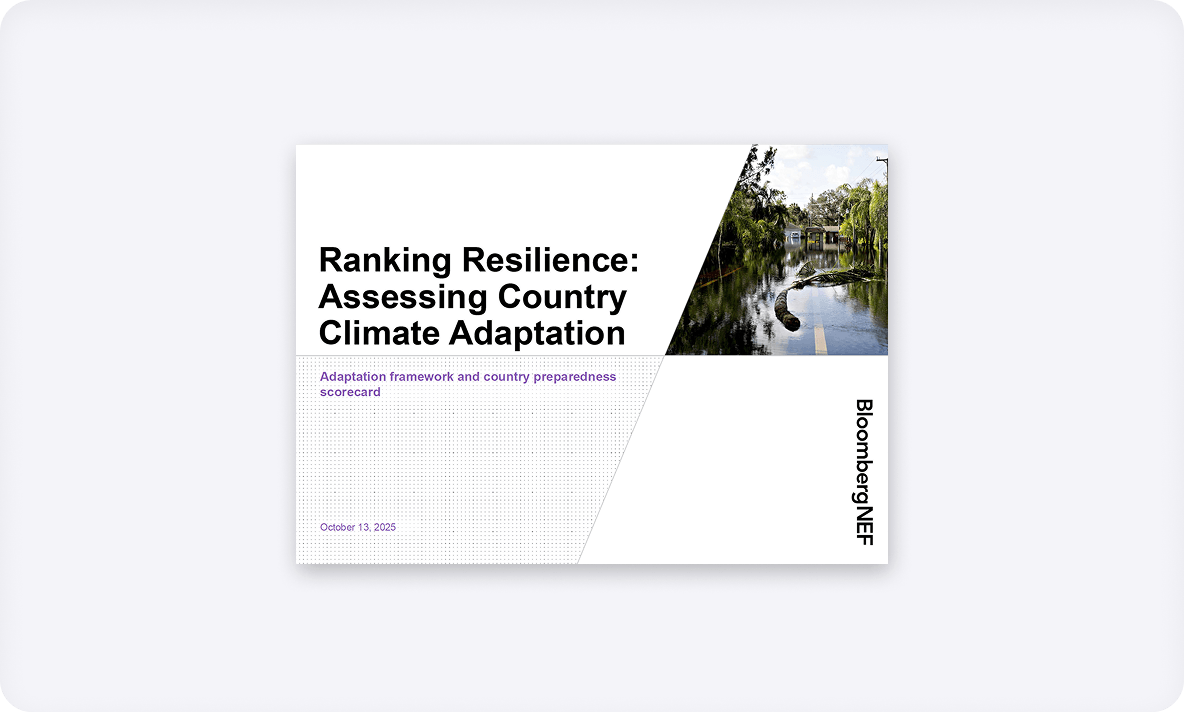
Ranking Resilience: Assessing Country Climate Adaptation
The physical impacts of climate change are already a significant financial risk that costs the global economy at least $1.4 trillion per year. A country’s preparedness for these impacts can materially influence the probability of loss for the assets, companies and societies located in it. To assess this, BloombergNEF has developed a framework and country scorecard that examines the climate adaptation preparedness of major economies.
October 13, 2025
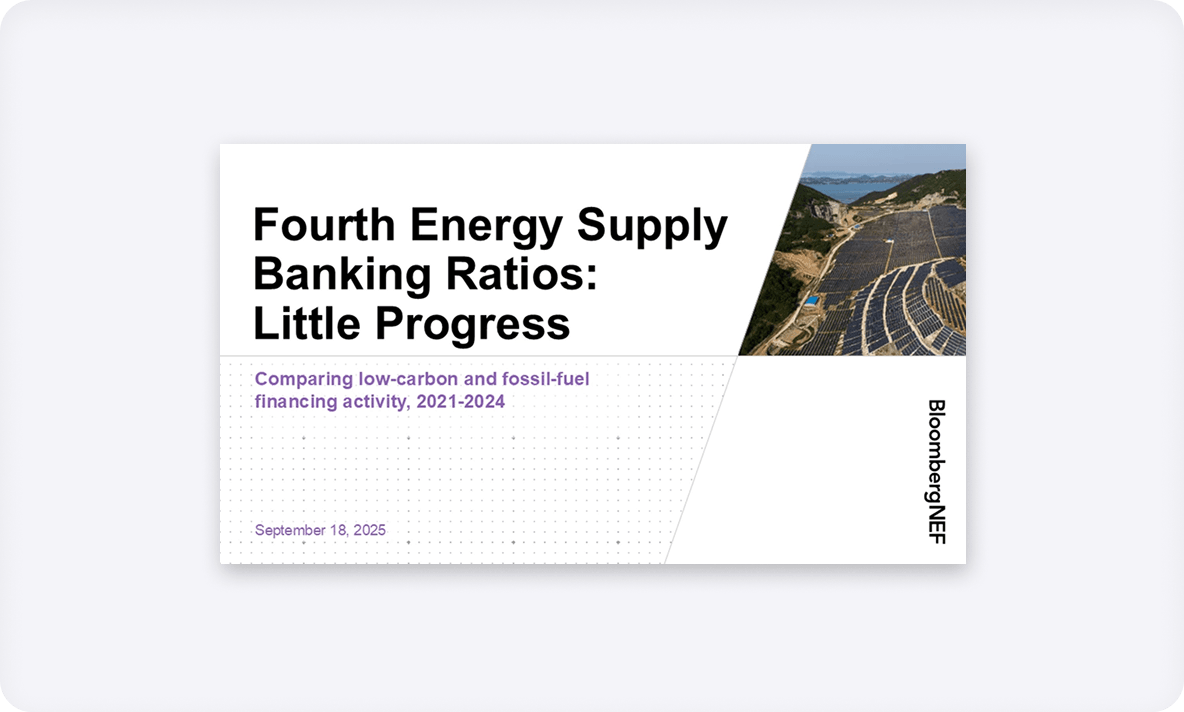
Fourth Energy Supply Banking Ratios: Little Progress
BloombergNEF has assessed how much money global banks are channelling into the energy transition. The fourth Energy Supply Banking Ratio report finds that some 2,000 banks collectively made little progress last year to finance more low-carbon solutions compared to activities that support fossil fuels. As a result, the banking industry is not yet delivering the money needed to limit climate change.
September 18, 2025
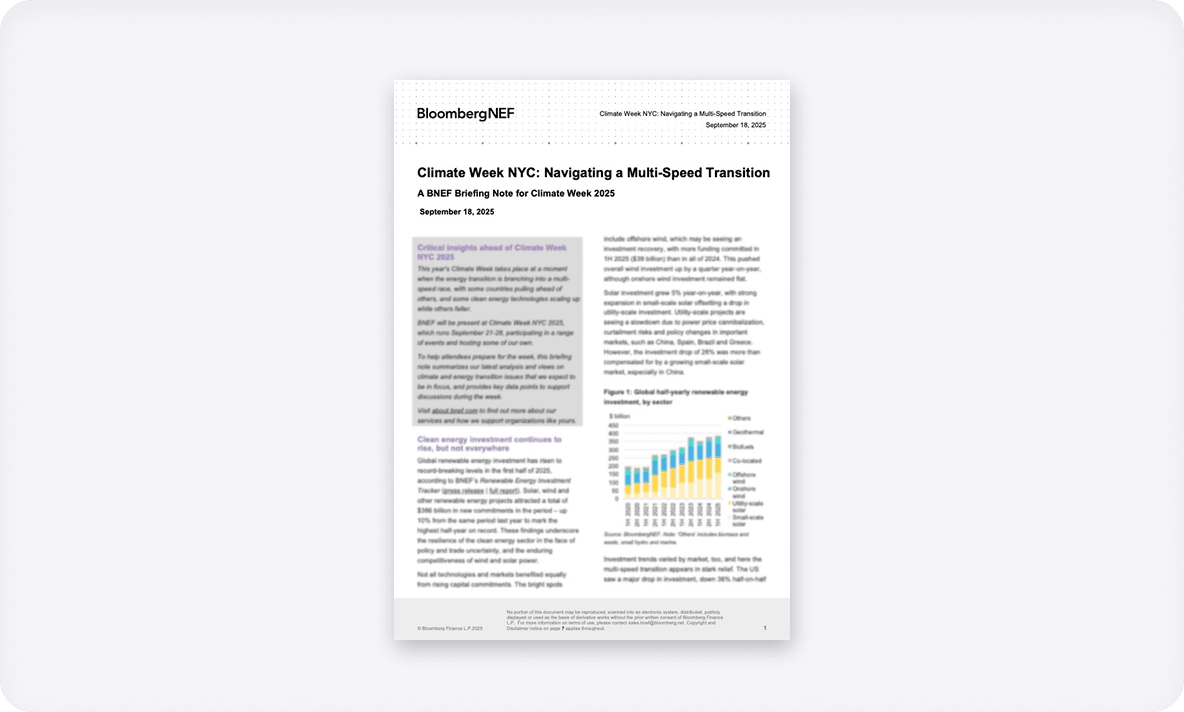
Climate Week NYC: Navigating a Multi-Speed Transition
This year’s Climate Week NYC takes place at a moment when the energy transition is branching into a multi-speed race, with some countries pulling ahead of others, and some clean energy technologies scaling up while others falter.
To help attendees prepare for the week, this briefing note summarizes our latest analysis and views on climate and energy transition issues that we expect to be in focus, and provides key data points to support discussions during the week.
September 18, 2025
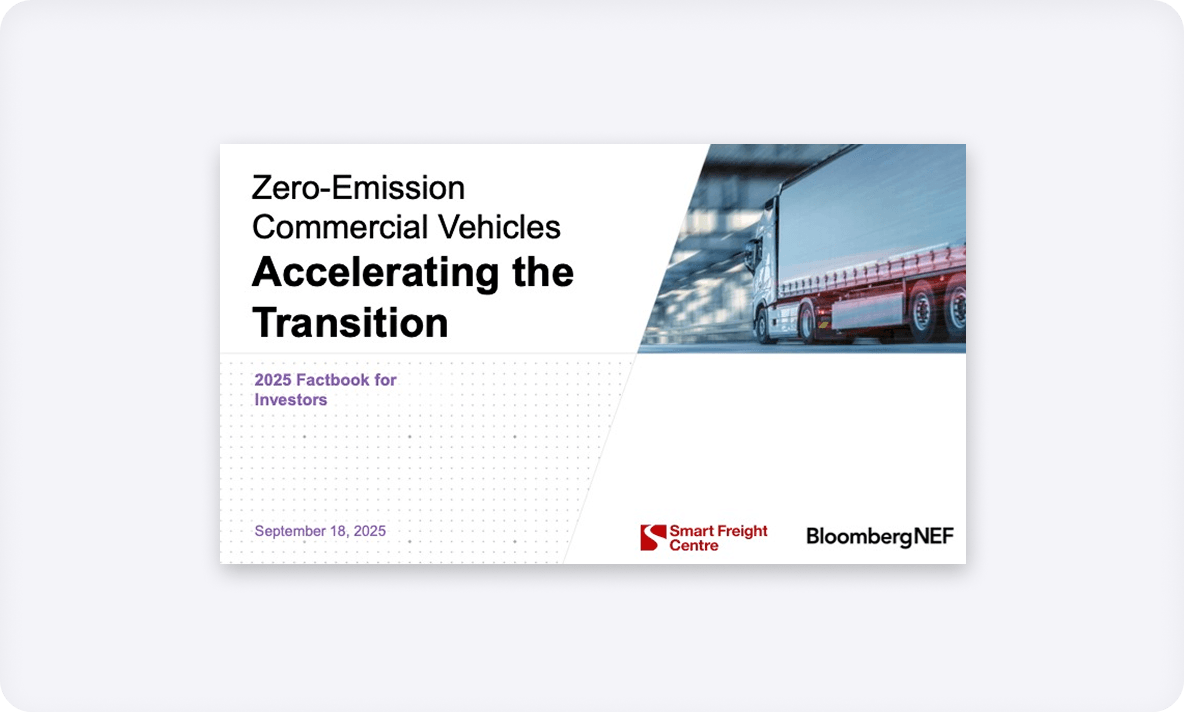
Zero-Emission Commercial Vehicles: Accelerating the Transition
This report, produced in partnership with Smart Freight Centre, documents the state of the zero-emission commercial vehicle market to help decision-makers navigate the nascent sector. It shows that despite economic and infrastructure challenges, the transition to cleaner road freight has started and is gathering pace. Market participants are actively addressing the challenges related to the value of commercial vehicles and batteries throughout their lifetime, indicating that some of these risks are not as severe as originally expected.
September 18, 2025

Brazil Transition Factbook 2025
The 2025 edition of the Brazil Transition Factbook, produced by BloombergNEF and commissioned by Bloomberg Philanthropies, aims to support policy, business and investment professionals by making available key data about the country’s energy transition, as well as the trends, challenges and opportunities that are shaping it.
March 31, 2025

Opportunity Blossoms
Shifting the financial flows of the real economy away from activities that are damaging nature toward profitable alternatives is key to meeting the Global Biodiversity Framework goals. BNEF has profiled 12 companies realizing financial gain by mitigating the drivers of nature loss.
October 25, 2024

Biodiversity Finance Factbook
Published to coincide with the COP16 summit, the third edition of BNEF’s Biodiversity Finance Factbook provides an update on the need for investment into nature, the current flows of finance, and the priority regions where this funding should be deployed.
October 22, 2024
Featured research

Emerging Markets Power Factbook
This is the 13th edition of Climatescope, BNEF’s annual assessment of energy transition opportunities. The report now covers 110 emerging and 30 developed markets around the world, or nearly every market in the world with more than two million inhabitants.
November 12, 2024

Climate Policy Factbook: COP29 Edition
Published ahead of the COP29 summit, the fifth BNEF Climate Policy Factbook focuses on three policy areas that would accelerate the transition to a low-carbon economy without considerable government outlay: fossil-fuel support, carbon pricing, and climate-risk policy.
November 7, 2024

Energy Transition Factbook
Clean power, electrified transport, and decarbonized industry are key to the energy transition. Our annual report, in collaboration with the Clean Energy Ministerial and Bloomberg Philanthropies, delves into these major trends and identifies critical solutions in each sector.
October 1, 2024

BNEF Global Energy & Industry Event
At BNEF’s New York Climate Week, industry leaders, policymakers and financiers spoke on strategies to mobilize capital and accelerate the net-zero transition. BNEF experts presented insights on scaling renewables, zero emission commercial vehicles, and our New Energy Outlook: US.
September 26, 2024

Unlocking Investment to Triple Renewables by 2030
COP28 committed to tripling renewables capacity from 2022 levels by 2030, which BNEF suggests is in line with a pathway to net-zero by 2050. This report examines if the world is investing enough to meet this target, where it is falling short, and how to remove barriers to deployment.
September 24, 2024

Africa Power Transition Factbook 2024
The African Union wants to bring 300GW of renewables online by 2030, which will require immediate quadrupling of capacity deployment rates. BNEF tracked a record $15B of investment in 2023 across Africa, but only a handful of countries are driving deployment at scale.
September 23, 2024

Zero-Emission Commercial Vehicles: The Time Is Now
Adoption of clean trucks varies widely between countries and use cases, but the economics are steadily improving as battery prices fall, and there is a growing opportunity for creative financing and business models to help this market scale up.
September 18, 2024

Energy Supply Banking Ratios: Implementation Guide
This guide sets out steps involved in calculating a bank’s ratio of low-carbon to fossil-fuel facilitated financing, in line with BNEF’s Energy Supply Banking Ratio. Where possible, it outlines a range of possible methodological design choices and scope of data inclusion.
September 18, 2024

Brazil Transition Factbook 2024
The first BNEF Brazil Transition Factbook, commissioned by Bloomberg Philanthropies, supports policy, business, and investment professionals by making available key data and insights on the country’s energy transition themes, trends, and opportunities.
September 18, 2024

NetZero Pathfinders: Delivering Net Zero – A Framework for Policymakers
NetZero Pathfinders simplifies policymakers’ search to find, design, and implement decarbonization strategies. It showcases the most effective policy solutions as best practices that can be replicated across an array of markets to accelerate progress to net zero.
September 12, 2024
Download the reports
Enter your details to download the ‘Biodiversity Finance Factbook: COP16 Edition’, the ‘Opportunity Blossoms: The Business of Curbing Nature Loss’, the ‘Brazil Transition Factbook 2025’ and the ‘Fourth Energy Supply Banking Ratios: Little Progress’ summary report.
Authors

Alistair Purdie
Analyst, Nature and Biodiversity
Opportunity Blossoms: The Business of Curbing Nature Loss

Ana Paula Teixeira
Climatescope, Applied research (São Paulo)
Climatescope 2024 Emerging Markets Power Factbook

Brynne Mary Merkley
Energy Transitions Associate
NetZero Pathfinders: Delivering Net Zero – A Framework for Policymakers

Emma Champion
Head of Regional Energy Transitions
Africa Power Transition Factbook 2024
NetZero Pathfinders: Delivering Net Zero – A Framework for Policymakers

Hugh Bromley
Food, Agriculture & Nature – Research Manager
Biodiversity Finance Factbook: COP16 Edition

Jenny Chase
Specialist, Clean Power
Unlocking Investment to Triple Renewables by 2030

Kobad Bhavnagri
Global Head of Strategy
Opportunity Blossoms: The Business of Curbing Nature Loss

Luiza Demôro
Energy Transitions Strategic Lead
Energy Transition Factbook
Africa Power Transition Factbook 2024
Brazil Transition Factbook

Maia Godemer
Sustainable Finance Policy
Climate Policy Factbook: COP29 Edition

Meredith Annex
Head of Clean Power
Unlocking Investment to Triple Renewables by 2030

Oliver Metcalfe
Head of Wind
Unlocking Investment to Triple Renewables by 2030

Sofia Maia
Country Transition Team Lead
Climatescope 2024
Emerging Markets Power Factbook

Victoria Cuming
Head of Global Policy (London)
Climate Policy Factbook: COP29 Edition
NetZero Pathfinders: Delivering Net Zero – A Framework for Policymakers

Vinicius Nunes
Brazil Power, GFANZ (Sao Paulo)
Africa Power Transition Factbook 2024
Brazil Transition Factbook

Yiyi Zhou
Specialist, Clean Power
Unlocking Investment to Triple Renewables by 2030

